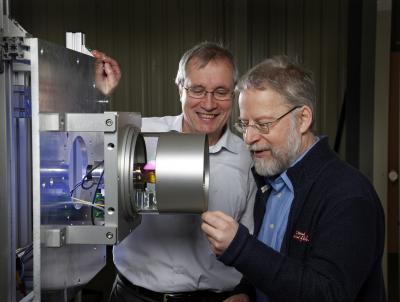Freiburg-based Fraunhofer Institute for Physical Measurement Techniques IPM scientists, Dr. Heinrich Höfler and Dipl.-Ing. Harald Wölfelschneider has developed a 3D laser scanner, effective for outdoor application.

Pictured are Dr. Heinrich Höfler and Dipl.-Ing. Harald Wölfelschneider (from left to right) with a 3-D laser scanner that improves safety and reliability on railroad tracks all over the world. Credit: Dirk Mahler / Fraunhofer
With its rapid and precision capability, the scanner can spatially monitor and calculate the location of the contact wire or the position of track from a train moving at a speed of 100 km/h or 62 m/h. The stationary scanner can capture passing trains and also check for missing loads.
According to Heinrich Höfler, the time travelled by the laser beam to reach the target and return back can help predict the distance of an object. Capturing the returning beam is a major challenge. The laser beam can be rapidly and effectively modulated. The time shift of this modulation wave can be accurately determined.
At standard mode, the system can measure one million times per second. This system is ideal for evaluating passing trains. A scanner is kept permanently mounted that allows longer views of the laser beam. The researchers developed a new infrared wavelength range, safe for the human eyes. The entire system had to be completely modified with safety features.
IPM team has developed a human eye-safe 3D scanner. When kept mounted onto a moving car, this scanner can completely scan the road from over 3m height. This scanner has been uniquely approved by the Federal Highway Research Institute for this specific application. It is capable of detecting potholes and water drainage potentials as well as lane grooves.
The laser system has been proven successful for rail traffic safety. It has already achieved worldwide commercialization. This system is rapid, powerful, and highly accurate. One of the 2012 Joseph-von-Fraunhofer awards will be presented to Dr. Heinrich Höfler and Dipl.-Ing. Harald Wölfelschneider honoring the development of this 3D laser scanner, safe for the human eye.
Disclaimer: The views expressed here are those of the author expressed in their private capacity and do not necessarily represent the views of AZoM.com Limited T/A AZoNetwork the owner and operator of this website. This disclaimer forms part of the Terms and conditions of use of this website.